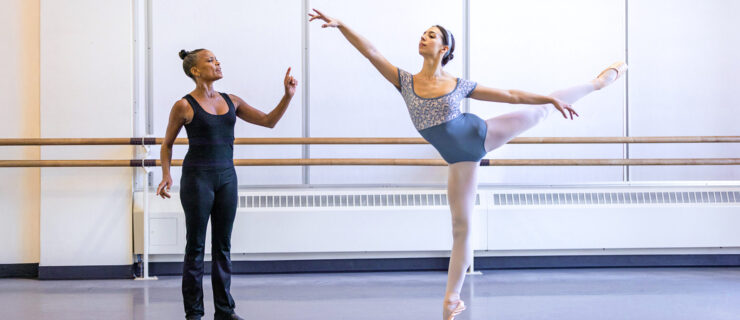How to Balance Performance Season With Academic Deadlines
Last fall, Cassidy Jarvis was juggling dance classes, Nutcracker rehearsals, AP courses and college applications. “It was chaotic, tiring and a bit stressful,” she admits. But now, as a freshman dance and psychology double major at Belhaven University in Jackson, Mississippi, Jarvis uses the skills she picked up in high school to stay on top of dance and academic responsibilities. Her biggest piece of advice: “Be present in the classroom and the studio. It can be easy to be in ballet thinking about assignments that are due and at school thinking about performances that are coming up, but not being present will lead to you missing opportunities to grow.”
Nutcracker season and spring performances often coincide with end-of-semester exams, papers and presentations. Worried about dropping the ball? Try these tips to strike the right balance.
Get Organized
Making it through performance/exam season starts weeks—or even months—prior. “The first thing I do when I get my dance and academic schedules is put everything into my calendar,” says Sydnie Holmes, Boston Ballet School’s Mikko Nissinen Artistic Scholar 2022–23. A high school senior in BBS’s professional division at Walnut Hill School for the Arts, Holmes uses a digital calendar. “I can access it wherever I am,” she says, “and I can share it with my family.”
Ryan Smallwood, a trainee with Colorado Ballet who is doing college online through the University of Utah, uses Trello, a project-management app that allows her to create custom checklists: “I’ll have a list for dance, a list for school, sometimes even lists of things like what I’ll cook each day,” she says. “You can add lists to your home screen, so you’ll see them all the time, and everything is specific to you.”

Or perhaps analog is more your style. “I like to write my to-do list down on paper,” says Brenda Welch, a trainee with Ballet West who is also a math major taking online courses at Indiana University. “It’s helpful to me to physically check something off once I’ve done it.”
Make sure to jot down not only big dates and deadlines, but also what will be expected of you beforehand. Milwaukee Ballet company member Elizabeth Harrison did this as she pursued her master’s degree while dancing full-time. “I wrote my entire schedule out three weeks in advance, down to the hour,” she says. The more organized you are up front, the less likely it is that things will slip through the cracks as life becomes more hectic.
Use Your Time Wisely
“Time management is a critical life skill,” says Jared Redick, assistant dean of ballet at University of North Carolina School of the Arts. “How do you balance the needs of your life in a positive way?”
It starts with Jarvis’ idea of being present. “In class, pay attention,” she says. “Actively listen. Take notes. Then, when it’s time to study for exams, it’s not new information.”

As your days get busier, be on the lookout for pockets of free time. Redick often sees students doing schoolwork during show run-throughs, when they aren’t needed onstage. Harrison bought noise-canceling headphones to work in the changing room during breaks, while Jarvis drove to a nearby coffee shop between Nutcracker rehearsals. “Instead of saying ‘I only have half an hour, so there’s no point,’ you can take small steps toward a bigger goal,” Jarvis says. “For instance, outline an essay so that later, you already have ideas mapped out.”
Keep in mind that time management is not one-size-fits-all. When and how are you most productive? Smallwood prefers to do schoolwork in the evenings, when her dance day is done. “But during shows,” she says, “I’m performing in the evenings. So then I’ll try to do most of my schoolwork for the week on Sundays.” Find a routine that works for you—and stick to it.
Talk to Your Teachers
Don’t be afraid to communicate with teachers about your performance schedule. “I took a science class last year that was taking a lot of time that I did not have,” Holmes recalls. “Quite a few of my assignments were being submitted late.” Feeling discouraged, she met with her teacher. “I told him what was going on and we came to an understanding,” she says. “He knew I might take a little longer, and I agreed to ask for help when I needed it.”
Advocating for yourself isn’t always easy, but it’s necessary. “Coming from ballet culture, asking for help seems like a weakness, but dancers have to get over this,” says Harrison. “I know I had to!”

Redick agrees. “As teachers, we want students to let us know if they’re falling behind.” The key is to clearly communicate your struggles and needs to both your dance and academic instructors—as early as possible. “Emergencies happen,” Redick notes, “but if there’s lead time, that’s much easier to accommodate.”
In general, “telling your directors and teachers what you’re doing in your life is a good way to keep yourself sane,” Welch says. “My trainee coordinator at Ballet West is aware of who has jobs and school, and my advisor at Indiana University knows I’m a dancer. I feel supported from both ends.”
Be Kind to Yourself
No matter how busy you are, make time for breaks. Harrison chose not to do homework on Saturday evenings, and was determined not to give up sleep in the pursuit of her degree. Holmes feels similarly about the importance of rest: “I prioritize sleep so that when I’m awake, I can focus,” she says. She also finds little ways to recharge: “When I’m feeling burned out, doing something I love, like having a cup of tea and watching the sun rise, really helps.”
Jarvis agrees that taking care of yourself is vital: “If you’re stressed out and overwhelmed, you won’t perform to the best of your abilities. If you don’t take breaks, eventually you’re going to break, and you won’t be able to do the things you love in abundance.”





